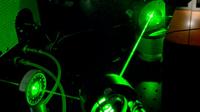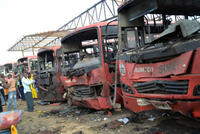-
U.S. to require railroads to notify states when oil is shipped

With the increase in available oil from fracking and larger pipeline capacity, railways are moving more and more oil. Rail companies moved 400,000 oil carloads in 2013, dwarfing 2005’s 6,000 oil carloads. The increase in oil shipments of oil has led to an increase in the number of accidents involving oil tankers. In the wake of recent accidents, the U.S. Department of Transportation (DOT) has released an emergency order to railroad companies which is designed to reduce the risk when shipping crude oil across the nation.
-
-
Bolstering shipping security
During a press conference following the March 2014 Nuclear Security Summit in the Hague, President Barack Obama noted that his biggest security concern was not Russia — or any other regional superpower — but rather “the prospect of a nuclear weapon going off in Manhattan.” Experts say that the most likely way in which a nuclear weapon would potentially come to a major U.S. city is not on the tip of a missile but in the belly of a ship, noting that this view has been openly validated by the intelligence community. In 2007, Congress passed a law requiring all overseas cargo containers to be inspected before they are loaded on a U.S.-bound ship. That law, however, has never been enforced.
-
-
TSA expands PreCheck screening program to international airlines
The TSA is expanding its PreCheckscreening program to passengers on international airlines. Air Canada is the first international carrier to join the list of PreCheck carriers, which already includes several U.S. airlines.Some international airlines are reluctant to join the PreCheck carrier list because it entails upgrading their computer systems to print a PreCheck logo and embed PreCheck data in their boarding pass barcodes. With Air Canada joining the list, the TSA believes other foreign carriers with a large U.S. passenger base would benefit if they offered PreCheck status to their customers.
-
-
Using light to detect trace amounts of explosives

Researchers may help in the fight against terrorism with the creation of a sensor that can detect tiny quantities of explosives with the use of light and special glass fibers. The researchers describe a novel optical fiber sensor which can detect explosives in concentrations as low as 6.3 ppm (parts per million). It requires an analysis time of only a few minutes.
-
-
Would real-time tracking have helped missing flight MH370?
The introduction of constant tracking of commercial aircraft during the whole journey has been raised by Malaysian authorities in a preliminary report into missing flight MH370. There have now been two occasions during the last five years when large commercial air transport aircraft have gone missing and their last position was not accurately known. There is little doubt that as the search for MH370 continues without finding evidence of the actual site of the wreckage, and the associated search costs continue to rise, changes to air safety will be made. Already there is a suggestion to increase the duration of the recording time of the cockpit voice recorders from two to twenty hours. The emphasis on looking for alternate means of tracking transport aircraft, and the interest in establishing systems for routine transmission and remote storage of flight data, will also grow within governments globally.
-
-
More crude oil shipments by rail mean more accidents, but security measures lag

American rail companies have long operated under federal laws, making it difficult for local officials to gather information on cargo and how rail companies select their routes. An increase in the number of trains transporting crude oil, accompanied by a series of derailments and explosions, has highlighted the dangers of transporting hazardous substances by rail.In February, the Department of Transportation announced that railroads had voluntarily agreed to apply the same routing rules to oil trains that they currently apply to other hazardous materials. Critics say more needs to be done.
-
-
New scanning technique may end on-board liquid restrictions
A new machine which can identify the chemical composition of liquids sealed within non-metallic containers without opening them is one of three candidates announced Monday to be in the running to win the U.K.’s premier engineering prize, the MacRobert Award. Already being deployed in sixty-five airports across Europe, this innovation can protect travelers by screening for liquid explosives and could spell the end of the ban on liquids in hand luggage.
-
-
The Nigerian bus terminal attack: Public transport is a lucrative terror target

During the morning rush hour on 14 April, a car bomb containing an estimated 500-800 pounds of explosives blew up at the Nyanya District bus station on the outskirts of Abuja, Nigeria. Terrorism experts from the Mineta Transportation Institute (MTI) say we should note the significance of the attack for the rest of the world and put the facts into a larger perspective. Looking at all attacks on public surface transportation systems worldwide since 1970, the Abuja bombing was the twelfth most lethal attack. When comparing similar attack methods, it was the ninth most lethal attack.
-
-
Human behavior studies offer helpful insights to airport security officers
A recent Sandia National Laboratories study offers insight into how a federal transportation security officer’s thought process can influence decisions made during airport baggage screening, findings which are helping the Transportation Security Administration (TSA) improve the performance of its security officers. The TSA-funded project focused on the impacts on threat detection when transportation security officers are asked to switch between the pre-check and standard passenger lanes.
-
-
Conventional theories about Titanic disaster are flawed
Previously it had been suggested that the seas which sank the famous cruise ship — which set off on its maiden voyage 102 years last week (Thursday 10 April 2014) — had an exceptional number of icebergs caused by lunar or solar effects. A new study finds, however, that the Titanic not unlucky for sailing in a year with an unusually high number of icebergs. In fact, the risk of icebergs higher now than it was in 1912.
-
-
Growing questions about TSA’s behavioral detection program
TSA has spent roughly $1 billion training thousands of “behavior detection officers” as part of theScreening of Passengers by Observation Techniques (SPOT) program. The purpose of SPOT is to identify facial and body expressions that signals terrorist activity. Psychologists – and the GAO – question the effectiveness of the program.“The common-sense notion that liars betray themselves through body language appears to be little more than a cultural fiction,” says one psychologist.
-
-
Costs of securing airports far outweigh the benefits: study
A recently published research paperconcludes that the funds allocated to secure the world’s major airports far outweigh the benefits. The authors write that “many of the assessed security measures would only begin to be cost-effective if the current rate of attack at airports in the U.S., Europe, and the Asia-Pacific increases by a factor of 10-20.”
-
-
U.S. lags behind other countries in commercial use of drones
As the United States continues to explore regulations and safety guidelines for commercial UAVs, other countries have already adopted their use. Photographers, real estate agents, filmmakers, and news agencies in the United States want to use drones in their operations, but the FAA insists that rules addressing safety challenges associated with drones need to be in place before drones can share the sky with manned aircrafts.
-
-
The global passport security loophole: how serious is it?
More than one billion people are estimated to have travelled internationally in 2013, according to the UN’s World Tourism Organization. The International Civil Aviation Organization (ICAO), a United Nations body that regulates air transport worldwide, reported that around 3.1 billion people travelled by airplane in 2013. The numbers are immense. As a result, so too are the security challenges for airlines, immigration, and airport security agencies. The ICAO expects all of its 192 member countries to introduce machine-readable passports by 2015, but there is still no international deadline for the introduction of biometric passports. This means some people could be using old-fashioned passports until 2025. Even then, there is no absolute guarantee biometric passports are any more tamper-proof than a host of other computer-based security measures which apply to credit cards and customer databases.
-
-
TSA suspends program aiming to screen passenger online info
The TSA has stopped testing a technology which reviews passengers’ online data as part of background checks for passengers who apply for the voluntary “Pre✓”program. The TSA had wanted to evaluate paper proposals, examine models, and test the proposed systems in real-world situations before issuing a contract, but now the TSA intends to explore other means of improving the background check process.
-
- All
- Regional
- Water
- Biometrics
- Borders/Immig
- Business
- Cybersecurity
- Detection
- Disasters
- Government
- Infrastructure
- International
- Public health
- Public Safety
- Communication interoperabillity
- Emergency services
- Emergency medical services
- Fire
- First response
- IEDs
- Law Enforcement
- Law Enforcement Technology
- Military technology
- Nonlethal weapons
- Nuclear weapons
- Personal protection equipment
- Police
- Notification /alert systems
- Situational awareness
- Weapons systems
- Sci-Tech
- Sector Reports
- Surveillance
- Transportation
Advertising & Marketing: advertise@newswirepubs.com
Editorial: editor@newswirepubs.com
General: info@newswirepubs.com
2010-2011 © News Wire Publications, LLC News Wire Publications, LLC
220 Old Country Road | Suite 200 | Mineola | New York | 11501
Permissions and Policies
Editorial: editor@newswirepubs.com
General: info@newswirepubs.com
2010-2011 © News Wire Publications, LLC News Wire Publications, LLC
220 Old Country Road | Suite 200 | Mineola | New York | 11501
Permissions and Policies
